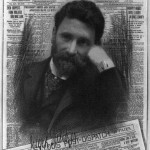Muckrakers
In the Progressive era, there were a group of writers known commonly known as the muckrakers. This group wrote public articles adressing the problems in American society. They were very succesful at hat they did, as many rules and prohibitions changed because Americans realized how wrong American society was and that we needed a change. The picture above depicts Joseph Pultzier, who was a Hungarian Immigrant and took over “The New York World” and transformed it into a place to bash the problems in American society



 The Federal Trade Commission was established by the U.S. Congress. Five members are joined together for a seven year term to police businesses. The main goal of this board is to promote and protect the rights of consumers. This includes identity theft, false advertising, monopolies, any kind of unfair business competition and price-fixing. Finally citizens were protected from market abuse and enjoyed ‘industrial freedom.’
The Federal Trade Commission was established by the U.S. Congress. Five members are joined together for a seven year term to police businesses. The main goal of this board is to promote and protect the rights of consumers. This includes identity theft, false advertising, monopolies, any kind of unfair business competition and price-fixing. Finally citizens were protected from market abuse and enjoyed ‘industrial freedom.’




 This is a picture of Henry Ford between 1863- 1947. Ford developed the techniques of production and marketing that brought in the reach of ordinary Americans. He established the Ford Motor Company in 1905. The Model T and assembly line innovations revolutionized American society and molded the world we live in today. Henry Ford used the assembly techniques to produce cars so that everyone can afford it.
This is a picture of Henry Ford between 1863- 1947. Ford developed the techniques of production and marketing that brought in the reach of ordinary Americans. He established the Ford Motor Company in 1905. The Model T and assembly line innovations revolutionized American society and molded the world we live in today. Henry Ford used the assembly techniques to produce cars so that everyone can afford it.
